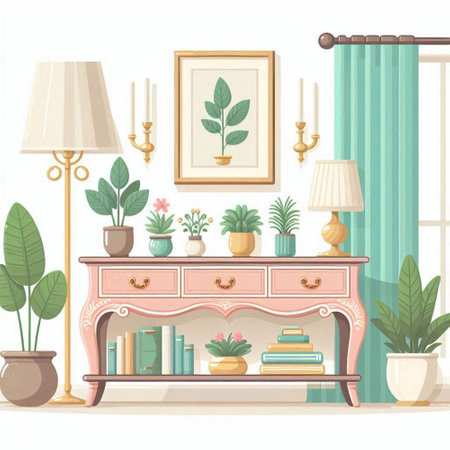1. Introduction to Downsizing in the UK
In recent years, downsizing has become a significant movement across the United Kingdom, capturing the imagination of homeowners and renters alike. This shift is influenced by a blend of economic pressures, such as rising property prices and living costs, as well as evolving attitudes towards what it means to live well. Traditionally, British homes have been seen as repositories for memories and possessions, but today’s climate encourages a more streamlined approach. The embrace of minimalism—alongside Eastern philosophies like Feng Shui—reflects a desire for simplicity, harmony, and intentionality in everyday life. As more Britons seek out smaller homes or declutter their existing spaces, they are not only responding to practical constraints but also redefining their relationship with material goods. This trend signals a broader cultural change: a move away from accumulation and towards mindful living, where letting go of clutter opens up space for new opportunities and greater peace of mind.
2. The Allure of Minimalism: A Contemporary British Perspective
Minimalism, once considered a continental or even far-Eastern concept, has quietly but firmly made its mark on the modern British lifestyle. The appeal lies not just in aesthetics, but also in how it resonates with traditional British values—restraint, pragmatism, and an appreciation for quality over quantity. As urban spaces in the UK grow ever more compact, especially in bustling cities like London and Manchester, the minimalist approach has become both a practical necessity and a design statement.
The roots of minimalism in Britain can be traced to its longstanding cultural emphasis on orderliness and understated elegance. From the classic Georgian terrace to post-war council flats, British homes have often favoured clever storage solutions and multi-purpose furniture. Today’s design trends continue this legacy, blending simplicity with function to maximise limited living space without sacrificing comfort or style.
Minimalism Meets Modern Urban Living
For city dwellers contending with rising property prices and smaller footprints, minimalism offers a way to create calm and inviting environments. Open-plan layouts, neutral colour palettes, and carefully selected furnishings allow natural light to flow freely, making even modest flats feel spacious. This mindful curation of possessions aligns perfectly with the age-old British adage: “a place for everything and everything in its place.”
How Minimalism Aligns with British Values
| Traditional British Value | Minimalist Design Principle | Real-Life Application |
|---|---|---|
| Pragmatism | Functionality over excess | Multipurpose furniture (sofa beds, storage ottomans) |
| Restraint | Edit possessions thoughtfully | Capsule wardrobes; decluttered surfaces |
| Quality over quantity | Selecting timeless pieces | Investing in durable kitchenware or classic armchairs |
| Appreciation for heritage | Blending old and new thoughtfully | Mixing antique finds with contemporary decor |
The Influence of Current Design Trends
The minimalist movement dovetails seamlessly with trends like biophilic design—bringing greenery indoors—and sustainable sourcing. Many Britons are now seeking out local artisans or upcycled materials when furnishing their homes, reducing waste while adding character. In essence, the modern British approach to minimalism is less about stark emptiness and more about intentional living: crafting spaces that nurture wellbeing while reflecting personal heritage.

3. Feng Shui and British Homes: Harmonising Space & Spirit
Once regarded as an exotic curiosity, Feng Shui has quietly woven its way into the tapestry of British home life, offering a harmonious counterpoint to the nations growing enthusiasm for downsizing and minimalism. Rooted in ancient Chinese philosophy, Feng Shui focuses on achieving balance between individuals and their environments—an aspiration that resonates with those seeking calm amid the bustle of modern British living. Across towns and cities, more UK homeowners are embracing these principles, intrigued by the promise of not only decluttered spaces but also improved wellbeing.
Feng Shui’s core ideas—such as the thoughtful arrangement of furniture, maximising natural light, and mindful selection of décor—pair surprisingly well with the classic charm of British architecture. From Victorian terraces to contemporary flats, applying Feng Shui might mean reimagining beloved bay windows as channels for positive energy (qi), or ensuring that hallways remain clear to invite luck and opportunity. This blending of Eastern wisdom with local sensibilities fosters homes that feel both restorative and distinctly personal.
The rise in popularity is also fuelled by a desire to create sanctuaries from the outside world. In a climate often marked by grey skies and compact living quarters, British homeowners are finding comfort in Feng Shui’s emphasis on harmony, simplicity, and purposeful design. Whether through subtle shifts—like positioning a favourite armchair to face a garden view—or more comprehensive reorganisation inspired by Bagua maps, this ancient practice is being adapted in creative ways across the UK. Ultimately, Feng Shui offers not just a method for arranging objects, but an invitation to cultivate peace and possibility within every room.
4. Letting Go of Clutter: The Emotional Journey
Downsizing in the UK is not merely a physical process of reducing possessions; it is a deeply emotional journey that taps into our memories, identities, and sense of belonging. For many Britons, the act of letting go can stir up a complex web of feelings—nostalgia for family heirlooms, guilt over unused gifts, or anxiety about losing a piece of one’s history. Understanding these psychological hurdles is key to successfully embracing minimalism and the principles of Feng Shui.
The British Perspective on Sentimental Belongings
In British culture, there is often a strong attachment to objects that represent tradition, heritage, or milestones. Many people hold onto items passed down through generations, such as grandmother’s tea set or wartime letters. The thought of parting with these objects can feel like severing ties with the past. However, those who have embarked on decluttering journeys report unexpected relief and clarity after releasing possessions that no longer serve them.
Voices from Across the UK
| Name | Location | Decluttering Insight |
|---|---|---|
| Margaret | Yorkshire | “Letting go of my late husband’s books was daunting, but I found comfort knowing they could inspire someone else.” |
| Sanjay | Bristol | “My parents’ home was full of relics from India. Donating some allowed me to honour my heritage while making space for my own story.” |
| Olivia | Kent | “It took several rounds before I could part with childhood toys. Each step helped me appreciate what truly matters.” |
Navigating the Emotional Landscape
Experts suggest practical strategies to ease this transition. Start small—perhaps with a single drawer or wardrobe—and set realistic goals. Invite friends or family to share stories about cherished items before deciding their fate. Some choose to photograph treasured possessions before donating them, preserving the memory without occupying physical space.
The Rewards of Letting Go
Britons who have embraced downsizing consistently report feelings of lightness and renewed energy. Decluttering not only transforms living spaces but also fosters mental well-being and empowers individuals to focus on present joys rather than past attachments. In essence, the emotional journey of letting go is an act of self-care—one that aligns beautifully with both minimalist ideals and the harmonious flow encouraged by Feng Shui.
5. Practical Tips for Downsizing in the UK
Effective Decluttering: Where to Begin
Embarking on a downsizing journey begins with an honest audit of your belongings. Start by categorising items into essentials, sentimental keepsakes, and possessions that no longer serve you. Adopting the British tradition of the annual “spring clean” can help set a seasonal rhythm for decluttering. Consider the ‘one in, one out’ rule—each time you acquire something new, let go of an old item. Donate usable goods to local charity shops such as Oxfam or The British Heart Foundation, ensuring your unwanted items support community causes rather than ending up in landfill.
Making the Most of Limited Space
Homes across the UK, from Victorian terraces to contemporary flats, often come with unique spatial challenges. Opt for multi-functional furniture—think ottoman beds with storage, foldaway desks, or extendable dining tables—to maximise utility without crowding your living space. Utilise vertical storage solutions such as floating shelves or built-in cupboards to keep surfaces clear. In true British fashion, make use of under-stair nooks and garden sheds for additional storage while maintaining order indoors.
Sustainable Storage Solutions
Eco-conscious living is increasingly valued in UK households. Choose sustainable materials like wicker baskets, recycled cardboard boxes, or wooden crates sourced from local markets for stylish yet practical organisation. Look to brands prioritising eco-friendly practices or consider upcycling vintage finds from car boot sales and antique fairs—a nod to the UK’s love for heritage and craftsmanship. This approach not only reduces waste but also adds character and charm to your home environment.
Embracing Community Resources
The UK’s vibrant community spirit offers plenty of opportunities for sharing and rehoming goods. Participate in local swap events, use apps like Freecycle or Olio to pass on unwanted items, and join neighbourhood groups where resources can be exchanged or borrowed instead of bought anew.
Final Thoughts
Downsizing needn’t be daunting; with considered choices and community-minded actions, you can create a harmonious space that reflects both minimalist ideals and the best of British practicality. By letting go thoughtfully and organising sustainably, your home will become a serene sanctuary—one clutter-free corner at a time.
6. Navigating the Charity Culture: Donating and Repurposing in Britain
Downsizing in the UK is not just about ridding oneself of excess, but also embracing a long-standing tradition of generosity and resourcefulness that is embedded in British culture. The high streets of towns and cities across the country are lined with charity shops, from Oxfam to Sue Ryder, each acting as a haven for those looking to pass on preloved items and support worthy causes. Understanding how to navigate this vibrant landscape can turn decluttering into an act of community connection and sustainability.
The Charity Shop Experience
Charity shops are more than just second-hand stores; they are institutions that represent the British spirit of giving back. When downsizing, consider sorting items into categories such as clothing, books, bric-a-brac, and household goods. Most charity shops have clear donation policies—ensure your items are clean and in good condition, as donations must be suitable for resale. Some even offer collection services for larger furniture or electrical goods. By donating thoughtfully, you help these organisations raise vital funds while extending the life of your possessions.
Community Recycling Schemes
For items that might not suit the charity shop shelf—think broken electronics, worn textiles, or mismatched crockery—community recycling schemes come into play. Many local councils operate recycling centres or run periodic collection events specifically designed for hard-to-recycle goods. Look out for textile banks, electrical recycling points, or even local upcycling workshops. Engaging with these initiatives ensures that less ends up in landfill, aligning perfectly with both minimalist principles and environmental consciousness.
Creative Ways to Give Items a Second Life
The British love for creative repurposing is evident in everything from garden allotments made from reclaimed timber to quirky home décor fashioned from vintage finds. As you downsize, consider offering items via neighbourhood online groups like Freegle or Facebook Marketplace’s “free” section, where someone may give new purpose to your old treasures. Alternatively, get involved in community swap events or repair cafés—these foster social ties while promoting a culture of reuse. Embracing these creative avenues not only clears your space but also weaves your story into the wider tapestry of British community life.
7. Conclusion: Finding Balance and Wellbeing at Home
Embracing downsizing, minimalism, and the principles of Feng Shui invites us to create homes in the UK that are not only practical but also deeply nurturing. By letting go of clutter and thoughtfully curating our living spaces, we rediscover a sense of harmony that resonates with both traditional British sensibilities and contemporary lifestyles. The gentle art of decluttering is not simply about removing excess; it is an opportunity to reflect on what truly matters and to foster wellbeing within our own four walls.
The Harmony of Space and Mind
Through downsizing, we learn to cherish quality over quantity, making room for what brings us comfort and joy. Minimalism, when blended with the British appreciation for heritage pieces and personal mementos, results in interiors that feel both calm and characterful. Applying Feng Shui principles further encourages a balanced flow of energy, which can uplift our mood and support daily life. This synthesis of approaches brings a renewed sense of place—where every item has purpose, and every corner breathes tranquillity.
A Renewed Relationship with Home
As we release what no longer serves us, we open ourselves to new possibilities for living well. A decluttered home is easier to maintain, more welcoming to guests, and ultimately becomes a sanctuary from the bustle of modern British life. By consciously shaping our surroundings, we nurture a deeper connection to our homes—transforming them from mere shelters into true havens of balance and wellbeing.
Moving Forward with Intention
In the spirit of British pragmatism mixed with thoughtful reflection, downsizing and embracing minimalism are not trends but pathways to a richer domestic life. Whether in a cosy flat in Edinburgh or a cottage in the Cotswolds, these practices help us find clarity amid chaos and cultivate spaces where both tradition and innovation thrive. Ultimately, letting go of clutter allows us to live more intentionally—anchored by a sense of peace, purpose, and belonging in our uniquely British homes.


